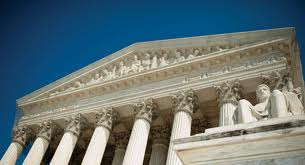The U.S. Court of Appeals for the Third Circuit recently upheld a trial court’s ruling that an unaccepted offer of judgment under Fed. R. Civ. Pro. Rule 68, made before a plaintiff files a motion for class certification, does not make the case moot. The copy of the opinion in Weitzner v. Sanofi Pasteur, Inc. is available at: Link to Opinion. The named plaintiff filed a putative class action against the defendants for alleged violation of the federal Telephone Consumer Protection Act (TCPA). The plaintiff alleged that the defendants transmitted more than 10,000 facsimiles to the plaintiff and other members of…
Posts published in “TCPA”
Yesterday’s decision from the U.S. Supreme Court in Spokeo v. Robins should bolster the defense of companies subject to several federal consumer protection statutes. The ruling addresses lawsuits that claim an injury created solely by the violation of a federal statute and require the plaintiff to demonstrate not only that the statute was violated, but that the plaintiff herself suffered harm. The opinion does not go as far as many in the consumer financial services industry would have liked (not all injuries must be “tangible”), but it does close the door on civil lawsuits many have faced. The opinion was…
The U.S. District Court for the Western District of New York recently held that claims under the federal Telephone Consumer Protection Act (TCPA), 47 U.S.C. § 227, et seq., are penal in nature and therefore do not survive the death of a plaintiff. In so ruling, the Court held that the TCPA’s provision of damages in the amount of $500 per phone call, which could be trebled up to $1,500, is “wholly disproportionate to the harm suffered.” Of note, the Due Process Clause of the Fourteenth Amendment of the U.S. Constitution prohibits the imposition of “grossly excessive or arbitrary punishments…
The U.S. District Court for the Northern District of California recently held that an amendment to the federal Telephone Consumer Protection Act (TCPA) enacted as part of the Bipartisan Budget Act of 2015 applies to calls made in 2014 “solely to collect a debt owed to or guaranteed by the United States,” and therefore granted summary judgment in favor of the defendant. A copy of the opinion in Silver v. Pennsylvania Higher Education Assistance Agency is available at: Link to Opinion. The plaintiff filed a putative class action under the TCPA alleging that, in or around January 2014, the defendant student…
The U.S. District Court for the Eastern District of North Carolina recently rejected a defendant’s arguments that its contract with the plaintiff did not allow revocation of prior express consent under the federal Telephone Consumer Protection Act (TCPA), and that the defendant’s telephone communication system was not an “automatic telephone dialing system” under the TCPA. A copy of the opinion in Cartrette v. Time Warner Cable, Inc. is available at: Link to Opinion. In 2013, the plaintiff requested that the defendant install cable services at her home, and agreed to a services agreement that included a paragraph titled, “Robo-Calls,” stating: “[Defendant]…
In a putative class action for alleged violation of the federal Telephone Consumer Protection Act (TCPA), 47 U.S.C. § 227 et seq., and notwithstanding the recent ruling by the Supreme Court of the United States in Campbell-Ewald Co. v. Gomez, 136 S. Ct. 663 (2016), the U.S. District Court for the Southern District of New York recently granted a defendant’s request to enter judgment in the consumer’s favor providing all relief sought only by the plaintiff in his individual capacity. A copy of the opinion in Leyse v. Lifetime Entertainment Services, LLC is available at: Link to Opinion. Since the time of this…
The U.S. District Court of the Western District of North Carolina recently stayed proceedings in a suit pending the U.S. Court of Appeals for the District of Columbia’s ruling on challenges to the Federal Communication Commission’s Declaratory Ruling and Order, 30 FCC Rcd. 7961 (2015) (the “FCC Order”) under the federal Telephone Consumer Protection Act (TCPA). A copy of the opinion in Abplanalp v. United Collection Bureau, Inc. is available at: Link to Opinion. The plaintiff’s credit card agreement contained an arbitration provision requiring that all claims against the lender, including claims against third parties to whom the plaintiff’s debt was…
The U.S. Court of Appeals for the Sixth Circuit recently affirmed summary judgment in favor of a debt collector on federal Telephone Consumer Protection Act (TCPA) allegations. In so ruling, the Court held that, by providing their cellular telephone number to the primary service provider when they incurred the debt, the plaintiffs gave their “prior express consent” to be called on their cellular telephones by the debt collector of a secondary services provider, even though the debt collector did not receive the cellular telephone numbers directly from the plaintiffs. A copy of the opinion in Zachary Baisden v. Credit Adjustments, Inc.…
In an unreported ruling, the U.S. Court of Appeals for the Ninth Circuit recently affirmed summary judgment for the defendant in a putative class action for alleged violation of the federal Telephone Consumer Protection Act (TCPA). The Court held that the named plaintiff expressly consented to the text message in question when she provided her cell phone number to a third party contracting with the defendant while using the third party’s services. A link to the opinion in Baird v. Sabre, Inc. can be found here: Link to Opinion. The named plaintiff booked flights online for herself and her family…
The U.S. Court of Appeals for the Ninth Circuit recently affirmed a district court’s order denying class certification in a lawsuit alleging violation of the federal Telephone Consumer Protection Act (TCPA), holding that the “district court did not abuse its discretion by finding the requirements of Rule 23(b)(3) unsatisfied,” and that the “district court appropriately determined that it would be extremely difficult to ascertain the identities of the individuals who had not consented to receive the messages.” A copy of the Ninth Circuit’s opinion in Gannon v. Network Telephone Services, Inc. is available at: Link to Opinion. A copy of the…
The Supreme Court of the United States recently held that a class action defendant cannot “pick off” the named plaintiff and thereby render the case moot by simply offering full relief by way of settlement offer or offer of judgment under Federal Rule of Civil Procedure 68. However, as the majority acknowledges, the Court also left open the question of what happens when a defendant actually tenders full relief to the named plaintiff, thus potentially leaving class action defendants an alternative weapon to cost-effectively defeat class claims. A copy of the opinion in Campbell-Ewald Co. v. Gomez is available at: Link…
The U.S. District Court for the Northern District of Illinois recently held that the automatic stay in bankruptcy does not, by itself, operate to revoke prior express consent under the federal Telephone Consumer Protection Act (TCPA). However, the Court also held that, in this particular case, the debtor had sufficiently alleged that she had not given consent to the creditor or debt collector defendants in the first place, and thus allowed the debtor’s individual and putative class TCPA claims to go forward. In addition, the Court rejected the debtor’s attempt to bring TCPA class claims for injunctive and declaratory relief,…











